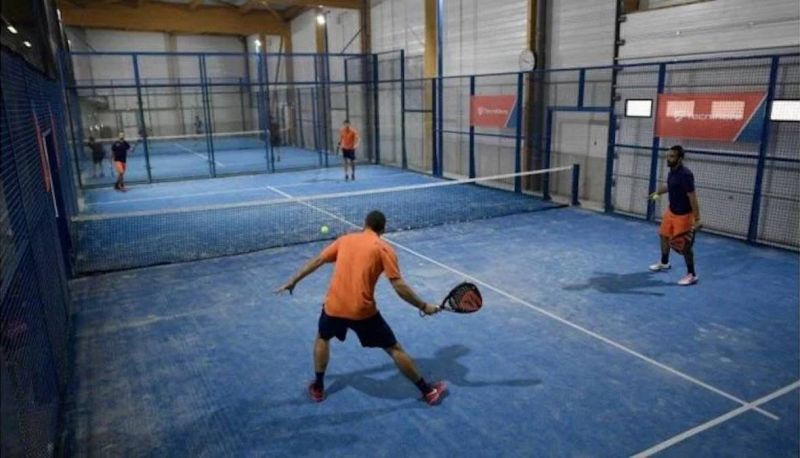
Padel is played by four players using pierced solid rackets, surrounded by glass walls. (Credit: AFP/archive)
BEIRUT — Few are they who admit to having never heard of it.
Following in the footsteps of tennis, ping pong, badminton, and squash, padel — not to be confused with paddle, a water sport — has firmly established itself in the landscape of racket sports.
Georges, a Lebanese citizen in his 20s, is a recent convert to padel. “I wanted to give it a try two months ago, after watching match videos on social media. Then I discovered that several courts had opened all over Lebanon and it was very easy to reserve a court for a game.”
Born in the 1970s in Mexico, this derivative of tennis and squash gained popularity in the early 2000s in Spain, where it became a truly national phenomenon, rising to the third-most-practiced sport on the Iberian Peninsula, with no less than 4 million registered players to date.
Fun and accessible
A court takes the form of a 20-meter-long by 10-meter-wide rectangle, divided by a net and bordered by glass walls within which two teams of two players equipped with solid rackets — with small holes rather than strings — compete. Point-scoring is similar to that of tennis.
This leads to long and often spectacular exchanges, where the ball bounces off the corners of the court.
According to the manager of the Padel Club in Beirut, which opened on the BIEL waterfront last summer, the unique court configuration and the ease of access for beginners explains why so many Lebanese have embraced padel in just one year.
“The small size of the court and the use of walls give the player immediate and easier access to [strike] the ball,” the Padel Club manager explains. “There is no need to have several months training under your belt to reach a sufficient level to have fun. That’s what makes padel accessible for beginners: from the first racket strokes, you can send the ball to the other side of the net.”
Fun but costly
The Padel Club manager says the number of players frequenting her establishment has almost doubled in one year.
“The number of reservations varies between 70 and 200 per day,” she says.
Furthermore, the majority of clubs have the advantage of staying open late, as some remain open until 1 a.m.
Summer is also a boon for many clubs, as a larger number of players take lessons.
“During this season, people have more free time,” she says. “They plan vacations more often, which creates an opportunity for individuals to engage in the sport.”
Sources who purport knowledge of Beirut’s padelling scene say setting up the facilities for playing the sport is not cheap. It seems the three courts at Beirut’s Padel Club cost $500,000 to build. As a result of such capital investment, the price of a padel session needs to be set quite high: to reserve a court or have a training session with a coach, aspiring padellers will have to spend around $60. That’s $15 per person for a game of four, a prohibitive expense for most people seeking a leisure activity, Lebanese included.
National competitions in the offing?
If padel attracts new enthusiasts, some look toward the next step: organizing national competitions.
This is a movement that the Padel Club has already started, promoting the largest padel tournament in Lebanon. It took place in May, with 36 competitors.
With significant prizes at stake — up to $10,000 for the winner and $5,000 for the runner up — perhaps a league comprising the country’s best players will be created in the coming years.
“Padel is expanding,” enthused the manager of the Padel Club in Beirut, “and more and more people are looking for a competitive experience in it. That’s why we have been organizing several tournaments since the club opened, and many more will follow in the future.”
This story originally ran in French in L’Orient-Le Jour.